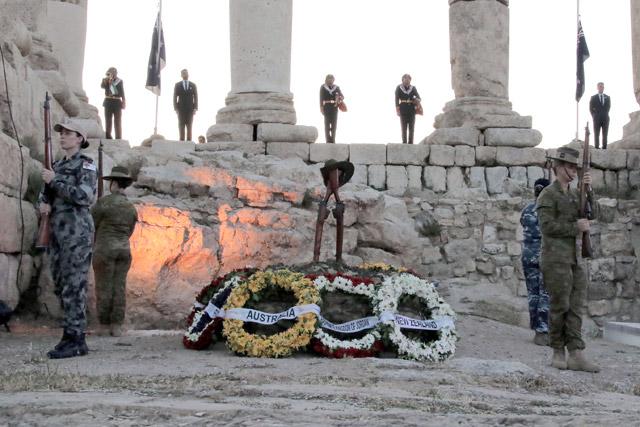You are here
Thousands remember Anzac heroism on Gallipoli centenary
By AFP - Apr 25,2015 - Last updated at Apr 25,2015
GALLIPOLI PENINSULA, Turkey — Thousands of Australians and New Zealanders on Saturday thronged the beaches of Turkey's Gallipoli peninsula to remember the heroism and sacrifice of their forefathers in the World War I campaign against the Ottoman Empire 100 years ago.
Troops from the Australian and New Zealand Army Corps (ANZAC) launched their first amphibious assaults on the peninsula in what is now western Turkey on April 25, 1915, splashing through the waters into a rain of Ottoman gunfire.
Many were killed in the initial assault and the overall Allied campaign ended in failure and evacuation.
But the spirit shown by the Anzac troops has long been seen as critical in forging a national identity in New Zealand and Australia. Both commemorate April 25 as Anzac Day.
Their descendants of all ages — many wrapped in national flags as extra protection against the early morning cold — attended the dawn service at what is now known as Anzac cove where the first attacks were concentrated.
The Anzac service as the sun rises above the Aegean Sea is a traditional annual event but gained extra importance in this centenary year, with even greater numbers than normal and an intense security blanket thrown around the area.
"Like every generation since, we are here on Gallipoli because we believe that the Anzacs represented Australians at our best," said Australian Prime Minister Tony Abbott at the service, which was also attended by New Zealand Premier John Key and the heir to the British throne Prince Charles.
Some 8,700 Australian and 2,800 New Zealand soldiers died thousands of kilometres from home in a devastating loss for the then thinly populated young nations.
'Ordinary men did extraordinary things'
Abbott recalled how the first Anzacs were "tradesmen, clerks, labourers, farmers and professionals" from all levels of society, "ordinary men [who] did extraordinary things".
As dawn broke, the bugler played the last post and the crowd fell silent for two minutes.
In Australia and New Zealand, record numbers of people also turned out to mark the centenary, with dawn services and parades held across the two countries.
"They loved and were loved in return, were prepared to fight for their beliefs, were like us prey to fears and human despair," said Chief of Army David Morrison in an emotive address in Canberra at the Australian War Memorial.
Britain's Queen Elizabeth II marked the centenary by leading a two-minute silence at London's Cenotaph war memorial, honouring all of those killed during the campaign.
She was joined by husband Prince Philip, Prime Minister David Cameron and other political leaders as she laid a wreath at Britain's main war memorial.
Her grandson Prince William — whose wife Kate is expecting a second child any day — also attended.
The monarch, her husband and Cameron later attended a service of commemoration at Westminster Abbey.
'Campaign a failure'
The nine-month Battle of Gallipoli is generally seen as a devastating military failure for the Allied powers against the German-backed Ottoman forces, who managed to resist the attempts to break through towards Constantinople.
The last Allied soldiers were evacuated in January 1916 with almost no casualties, in stark contrast to the bloody horror of the campaign itself.
"The Gallipoli campaign was a failure, of course; the only really successful part was the evacuation," admitted Abbott.
Estimates of the total numbers killed in the conflict differ, but most sources say at least 45,000 soldiers lost their lives on the Allied side including British, French, Gurkha and Newfoundland troops. A higher number, around 86,000, also died on the Ottoman side.
New Zealand's Key recalled the shock of the young Anzac troops when instead of the "open spaces that had been described to them, they landed here with steep hills rising in front of this narrow beach."
Reading poignant passages written by Anzac soldiers, Charles emphasised that the sacrifice of those who served "in this far away place on the other side of the world" should never be forgotten.
Turkey on Friday held the main international ceremonies for the Battle of Gallipoli, sending a message of peace and reconciliation between the former foes.
However, the decision to bring forward the anniversary by one day to April 24 was bitterly criticised by Armenians as an attempt to overshadow commemorations in Yerevan to mark the centenary of the mass killings of Armenians in the Ottoman Empire.
Related Articles
The Australian embassy in Amman marked the 100th anniversary of the battle of Gallipoli in World War I and Australian-New Zealand Army Corp (ANZAC) Day at dawn on Saturday, the Jordan News Agency, Petra, reported.
ISTANBUL — Turkish authorities have arrested a suspected Daesh member they believe was planning to attack a World War I commemoration at Gal
AMMAN — The Australian Embassy on Tuesday hosted a dawn service at the Amman Citadel to commemorate the anniversary of the first major milit


















